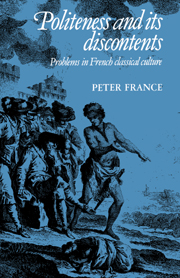Summary
‘Love is infinitely delightful to its object, and the more violent the more glorious. It is infinitely high; nothing can hurt it. And infinitely great in all extremes of beauty and excellency. Excess is its true moderation.’ These are the words of the English poet Traherne, writing in the mid seventeenth century about divine love. They are a far cry from the all too famous advice for human life given by Moliére's Philinte:
La parfaite raison fuit toute extrémité
Et veut que Ton soit sage avec sobriété
or its echo in Bouhours's Manière de bien penser: ‘Tout ce qui est excessif est vicieux, jusqu'à la vertu, qui cesse d'être vertu dès qu'elle va aux extrémités’.
Philinte and Bouhours may be taken as representatives of classical French culture, a culture of reasonable, sociable men and women, and their remarks can be extended beyond the moral field to encompass art and literature. From around the middle of the century, this culture defines itself against the excesses associated with the Italian-influenced baroque art of the preceding generations. What had seemed impressive comes to seem grotesque. Extravagant behaviour, extravagant feeling, and extravagant language are mocked and outlawed by the classical critics. Excess is the enemy of the new politeness.
At the same time, however, Traherne's praise of excess corresponds to an impulse which is not easily subdued – the impetus that produces not only religion, but art.
- Type
- Chapter
- Information
- Politeness and its DiscontentsProblems in French Classical Culture, pp. 11 - 26Publisher: Cambridge University PressPrint publication year: 1992

